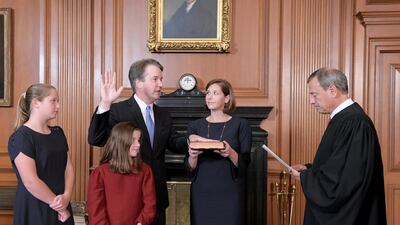The bitter battle over Brett Kavanaugh's nomination to the US Supreme Court has exacerbated the nation's political divide and left many Americans emotionally raw. It has also given new definition to the high stakes of November's midterm elections.
Until now, the fight for control of Congress has largely been viewed as a referendum on President Donald Trump's first two years in office. But the turmoil surrounding Mr Kavanaugh has transformed the midterms into something bigger than Mr Trump, with implications that could endure long after his presidency.
The election is suddenly layered with charged cultural questions about the scarcity of women in political power, the handling of sexual assault allegations, and shifting power dynamics that have left some white men uneasy about their place in American life.
Both parties contend the new contours of the race will energise their supporters in the election's final stretch. Both may be right.
Republicans, however, may benefit most in the short term. Until now, party leaders, Mr Trump included, have struggled to fire up their voter base, even with a strong economy to campaign on. The president's middling job approval rating and independent voters' disdain for his constant personal attacks have been a drag on Republican candidates, particularly in the more moderate suburban districts that will determine control of the House of Representatives.
But Republican operatives say internal polling now shows Mr Kavanaugh's acrimonious confirmation has given the party a much-needed boost, with its voters viewing Democrats as overzealous partisans following the public testimony by Mr Kavanaugh and Christine Blasey Ford, who accused the judge of trying to rape her while they were both in high school. Mrs Ford said she was "100 per cent" certain that Mr Kavanaugh was her attacker; he steadfastly denied her allegations.
The Democrats' "strategy to capitalise on the 'Me Too' movement for the political purposes backfired on them", said Republican strategist Alice Stewart. "The fact that they were willing to use Dr Ford's story that was uncorroborated to launch character assassinations on Judge Kavanaugh did not sit well with voters. A lot of people looked at this as a bridge too far."
_______________
Read more:
Thousands protest in Washington against Brett Kavanaugh vote
Democrats accuse FBI of 'very limited' Kavanaugh probe
_______________
The surge in Republican enthusiasm could recalibrate a political landscape that was tilting toward Democrats throughout the summer. Though Democrats still maintain an advantage in competitive House races, the past two weeks appear to have shifted momentum in the fight for the Senate majority back to the Republicans.
In North Dakota, Republican Representative Kevin Cramer, standing for Senate, has pulled comfortably ahead of Democratic Senator Heidi Heitkamp, who voted against Mr Kavanaugh's appointment. Republican operatives say they are seeing renewed party interest in states such as Wisconsin, where Democratic candidates for both Senate and governor have been polling strong.
"It's turned our base on fire," Senate majority leader Mitch McConnell said moments after the house confirmed Mr Kavanaugh on Saturday.
To be sure, some tightening in the race was inevitable. Wavering voters often move back toward their party's candidates as election day nears, and most of the competitive Senate races are in states that voted for Mr Trump by a significant margin.
With just over four weeks until the election, there is still time for the dynamics to shift again. And the political headwinds from the Mr Kavanaugh confirmation are unlikely to blow in just one direction.
To Democrats, Mr Kavanaugh's ascent to the Supreme Court in spite of decades-old sexual misconduct allegations will only deepen the party's pull with female voters, including independents and moderates who may have previously voted for Republicans. Democrats point to the flood of women who have spoken out about their own assaults following Mrs Ford's testimony before the Senate Judiciary Committee. Party operatives also believe the optics of the all-male Republican panel that presided over the hearing struck a chord with female voters.
"Kavanaugh's confirmation will leave a lot of outraged and energised women in its wake," said Geoff Garin, a Democratic pollster.
Democrats argue that some of the same tactics that have helped energise Republican voters also motivate their base, particularly Mr Trump's attacks on Mrs Ford. During a campaign rally in Mississippi, the president mocked Mrs Ford for not remembering key details of the alleged attack, including the date and location of the party she says she and Mr Kavanaugh attended 36 years ago.
"You've seen some shifts, but I still think that we're in a strong place," said New Mexico Representative Ben Ray Lujan, who heads the Democratic Congressional Campaign Committee. "I still think that it gives us a lot of enthusiasm on our side because there are a lot of people out there that are really upset, not just with the testimony that came from Judge Kavanaugh but the way the president was even mocking [Ford] days ago."
Mr Trump remains the campaign's biggest wild card. White House advisers and Republican senators are encouraging him to keep Mr Kavanaugh in the spotlight in the campaign's final weeks. But they are well aware that the president often struggles to stay on message and can quickly overshadow his political victories with new controversies.
Because of this, said Ms Stewart, the Republican strategist, the party cannot assume that this burst of momentum will sustain itself until election day.
"The question is whether this is the October surprise or the calm before the storm," she said.
_______________
Read more:
Kavanaugh's confirmation is just the start of this sorry story
From the Supreme Court to Cern, the absurdity of male victimhood
_______________

